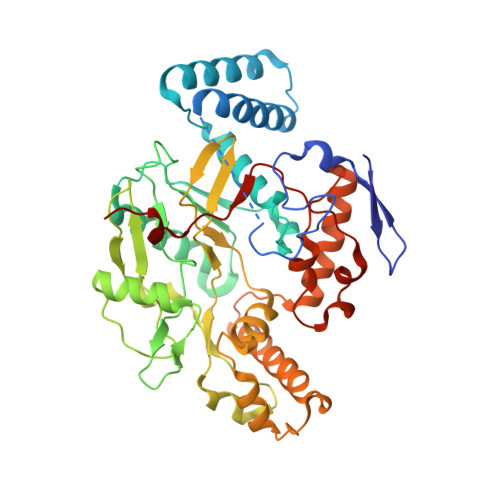Temperature-dependent spin crossover in neuronal nitric oxide synthase bound with the heme-coordinating thioether inhibitors.
Doukov, T., Li, H., Sharma, A., Martell, J.D., Soltis, S.M., Silverman, R.B., Poulos, T.L.(2011) J Am Chem Soc 133: 8326-8334
- PubMed: 21534614
- DOI: https://doi.org/10.1021/ja201466v
- Primary Citation of Related Structures:
3Q99, 3Q9A - PubMed Abstract:
A series of L-arginine analogue nitric oxide synthase inhibitors with a thioether tail have been shown to form an Fe-S thioether interaction as evidenced by continuous electron density between the Fe and S atoms. Even so, the Fe-S thioether interaction was found to be far less important for inhibitor binding than the hydrophobic interactions between the alkyl group in the thioether tail and surrounding protein (Martell et al. J. Am. Chem. Soc. 2010 , 132 , 798). However, among the few thioether inhibitors that showed Fe-S thioether interaction in crystal structures, variations in spin state (high-spin or low-spin) were observed dependent upon the heme iron oxidation state and temperature. Since modern synchrotron X-ray data collection is typically carried out at cryogenic temperatures, we reasoned that some of the discrepancies between cryo-crystal structures and room-temperature UV-visible spectroscopy could be the result of temperature-dependent spin-state changes. We, therefore, have characterized some of these neuronal nitric oxide synthase (nNOS)-thioether inhibitor complexes in both crystal and solution using EPR and UV-visible absorption spectrometry as a function of temperature and the heme iron redox state. We found that some thioether inhibitors switch from high to low spin at lower temperatures similar to the "spin crossover" phenomenon observed in many transition metal complexes.
Organizational Affiliation:
Macromolecular Crystallographic Group, Stanford Synchrotron Radiation Lightsource, SLAC, Stanford University, Stanford, California 94309, USA.



















